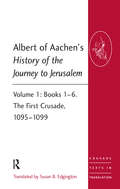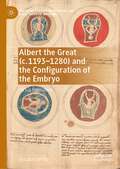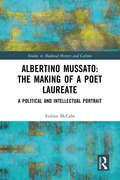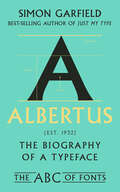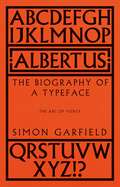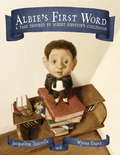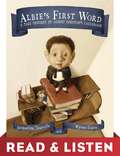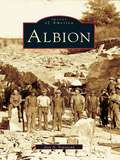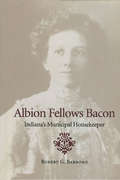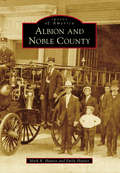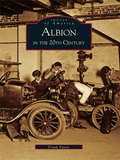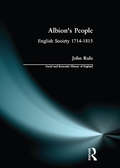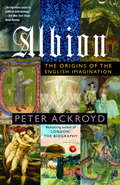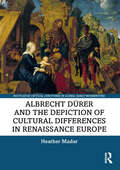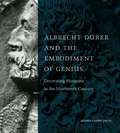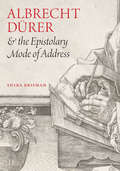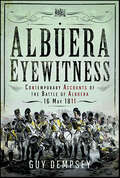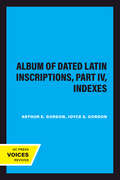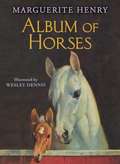- Table View
- List View
Albert of Aachen's History of the Journey to Jerusalem: Volume 1: Books 1–6. The First Crusade, 1095–1099 (Crusade Texts in Translation)
by Albert Of AachenAlbert of Aachen’s History of the Journey to Jerusalem presents the story of the First Crusade (1095-1099) and the early history of the crusader states (1099-1119). Volume 1, The First Crusade, is a long and richly detailed account of events well known from the reports of participants, such as Fulcher of Chartres, Raymond of Aguilers and the anonymous author of the Gesta Francorum, but told from a strikingly different perspective. Albert did not go on crusade himself, but gathered reports and anecdotes from those who did, and wove them into narrative that foregrounds the activities of Peter the Hermit, Godfrey of Bouillon, Baldwin of Boulogne, and their followers. His History therefore offers a counter-balance, and sometimes a corrective, to the established view. Susan B. Edgington’s English translation has been widely praised, following its first publication in the Oxford Medieval Texts series, and is here presented with a new introduction and updated notes and bibliography.
Albert the Great: Virtus Formativa (Palgrave Studies in Medieval and Early Modern Medicine)
by Amalia CerritoThis book provides the first comprehensive treatment of Albert the Great’s (c. 1193–1280) notion of virtus formativa, a shaping force responsible for crucial dynamics in the formation of living beings. Crossing the boundaries between theology and philosophy, the notion of virtus formativa, or formative power, was central in explaining genetic inheritance and the configuration of the embryo. By adopting an interdisciplinary approach, this book reconstructs how Albert the Great, motivated by theological open issues, reorganised the natural-philosophical and medical theories on embryonic development, creatively drawing upon Greek, Patristic, and Arabic sources. A valuable contribution to research, this book offers essential insights for those studying the history of embryology, medicine, and science in the medieval and renaissance periods.
Albert's Rain
by Annette SnyderAlbert's dream led him toward independence. Escaping slavery, and to pursue a life where no man controlled him, was his goal. Frivolities of friendships could vanish with the whip of a switch, but freedom could be held a lifetime. Rayna's choice was to set an example and board a ship so her people could survive. Only after arrival in America, at Bristol Plantation, did she realize what consequences her sacrifice held. Her surrender meant life as a slave and separation from her island family. Can Albert's heart transcend language and barriers of repression and allow Rayna close? Will Rayna put aside hurt caused by the plantation owner and permit Albert's love to heal her heart? Can the pair abandon mistrust and let the kindness of strangers be their salvation?
Alberta's Day Care Controversy: From 1908 to 2009 and Beyond
by Tom LangfordDay care in Alberta has had a remarkably durable history as a controversial issue. Since the late 1950s, disputes over day care programs, policies, and funding have been a recurring feature of political life in the province. Alberta’s Day Care Controversy traces the development of day care policies and programs in Alberta, with particular emphasis on policy decisions and program initiatives that have provoked considerable debate and struggle among citizens. For most of Alberta’s first fifty years as a province, day care was treated as a private rather than a public issue. Beginning in the late 1950s, however, debates about day care began to appear regularly on the public record. Dr. Tom Langford brings to light the public controversies that occurred during the last four decades of the twentieth century and the first decade of the new millennium, placing contemporary issues in historical context and anticipating the elements of future policy struggles.
Albertino Mussato: A Political and Intellectual Portrait (Studies in Medieval History and Culture)
by Aislinn McCabeThis book examines the life and political career of Albertino Mussato (1261–1329), a Paduan poet, historian and politician. Mussato was one of the first writers of the late medieval period to begin reviving classical Latin in his works. His classical style tragic drama Ecerinis, inspired by the writings of Seneca, paved the way for him to be crowned as the first poet laureate since antiquity. This work outlines how Mussato depicted the course of his own career, from being an impoverished teenager of insignificant birth to becoming a celebrated poet and scholar, as well as an influential political figure. It looks specifically at the years leading up to Mussato’s public coronation, on 3rd December 1315, as poet laureate for his city. His writings are a key component of his political manoeuvres as he tried to navigate through the troubled waters of northern Italian politics. The book demonstrates how the sources pertaining to Mussato’s life and career are part of an exercise in self-promotion and self-fashioning, intended to secure his position within factional politics, but rooted in a philosophical approach derived from his early classical studies. Accordingly, this book acts as a fully-fledged account of the interaction between Mussato’s writings and his political career, and how this contributed to his rise to fame.
Albertus: The Biography of a Typeface (The ABC of Fonts Series #0)
by Simon GarfieldA compact and charming history of the beloved handcrafted font by the New York Times best-selling author of Just My Type. Albertus, first carved on a bronze tablet in the 1930s by German Jewish refugee Berthold Wolpe, has proved to be one of the most enduring handcrafted typefaces in the world. It is at once modern and timeless, authoritative and whimsical—renowned as the typeface of London Street signs, David Bowie albums, and Star Wars movie posters. In this unique celebration, best-selling author Simon Garfield charts the story of the creation of Albertus, its innumerable and vibrant uses, and the erratic brilliance of its designer, as recounted by Wolpe’s children. Through his exploration of this singular font, Garfield grapples with one of the most fundamental artistic questions: what makes great art not only survive but flourish in each new age and medium?
Albertus: The Biography of a Typeface (The ABC of Fonts) (The ABC of Fonts)
by Simon GarfieldOne of the most beautiful handcrafted typefaces in the world, Albertus is also one of the most enduring. The face of thousands of book jackets, and the chosen look for David Bowie, Coldplay, Star Wars and London street signs, Albertus is as as warmly enticing on film posters as it is on memorial plaques.The story of the font is one displacement (its designer Berthold Wolpe was a German Jewish refugee who went on to design the masthead for The Times), but also one of permanence, for it has proved a fresh, vibrant and indestructible face for almost a century. In this unique celebration, the designer's children reveal the history of its creation and the erratic brilliance of their father, while the book grapples with one of the fundamental artistic questions: what makes great art not only survive but flourish in each new age and medium?
Albert’s Way: The First North American Congress on the Carmelite Rule
by Michael MulhallThe book deals with the Carmelites who represented one offshoot of the rich, fervent and creative society that formed Europe's medieval--from about 1100 until 1500--and particularly Norman, society.
Albie's First Word: A Tale Inspired by Albert Einstein's Childhood
by Wynne Evans Jacqueline TourvilleHere's a beautiful historical fiction picture book--perfect for the Common Core--that provides a rare glimpse into the early childhood of Albert Einstein, the world's most famous physicist. Three-year-old Albie has never said a single word. When his worried mother and father consult a doctor, he advises them to expose little Albie to new things: a trip to the orchestra, an astronomy lecture, a toy boat race in the park. But though Albie dances with excitement at each new experience, he remains silent. Finally, the thoughtful, quiet child witnesses something so incredible, he utters his very first word: "Why?" Kids, parents, and teachers will be delighted and reassured by this joyous story of a child who develops a bit differently than others."More than a distinctive introduction to Albert Einstein, this book promotes both understanding of difference and scientific curiosity." --Kirkus Reviews, StarredFrom the Hardcover edition.
Albie's First Word: Read & Listen Edition
by Jacqueline TourvilleHere&’s a beautiful historical fiction picture book that provides a rare glimpse into the early childhood of Albert Einstein, the world&’s most famous physicist. Three-year-old Albie has never said a single word. When his worried mother and father consult a doctor, he advises them to expose little Albie to new things: a trip to the orchestra, an astronomy lecture, a toy boat race in the park. But though Albie dances with excitement at each new experience, he remains silent. Finally, the thoughtful, quiet child witnesses something so incredible, he utters his very first word: &“Why?&” Kids, parents, and teachers will be delighted and reassured by this joyous story of a child who develops a bit differently than others.This Read & Listen edition contains audio narration.
Albion (Images of America)
by Avis A. TownsendAlbion highlights a historic community in the Lake Ontairo region of western New York State. With vintage photographs and fascinating detail, the book records Courthouse Square, early salt roads and quarries, splendid cobblestone houses, the Erie Canal passing through town, famous resident George Pullman, Rich's Corners, two correctional facilities, and the outstanding garden-style Mount Albion Cemetery.
Albion Fellows Bacon: Indiana's Municipal Housekeeper
by Robert G. BarrowsAlbion Fellows BaconIndiana’s Municipal HousekeeperRobert G. BarrowsExamines the career of a leading Progressive Era reformer.Born in Evansville, Indiana, in 1865, Albion Fellows was reared in the nearby hamlet of McCutchanville and graduated from Evansville High School. She worked for several years as a secretary and court reporter, toured Europe with her sister, married local merchant Hilary Bacon in 1888, and settled into a seemingly comfortable routine of middle-class domesticity. In 1892, however, she was afflicted with an illness that lasted for several years, an illness that may have resulted from a real or perceived absence of outlets for her intelligence and creativity.Bacon eventually found such outlets in a myriad of voluntary associations and social welfare campaigns. She was best known for her work on behalf of tenement reform and was instrumental in the passage of legislation to improve housing conditions in Indiana. She was also involved in child welfare, city planning and zoning, and a variety of public health efforts. Bacon became Indiana’s foremost "municipal houskeeper," a Progressive Era term for women who applied their domestic skills to social problems plaguing their communities.She also found time to write about her social reform efforts and her religious faith in articles and pamphlets. She published one volume of children’s stories, and authored several pageants. One subject she did not write about was women’s suffrage. While she did not oppose votes for women, suffrage was never her priority. But the reality of her participation in public affairs did advance the cause of women’s political equality and provided a role model for future generations.Robert G. Barrows, Associate Professor of History at Indiana University at Indianapolis, was previously an editor at the Indiana Historical Bureau. He has published several journal articles and book chapters dealing with Indiana history and American urban history, and he coedited (with David J. Bodenhamer) the Encyclopedia of Indianapolis (Indiana University Press).ContentsThe Sheltered LifeThe Clutch of the ThornsAmbassador of the PoorThe Homes of IndianaChild WelfareCity Plans and National Housing StandardsProse, Poetry, and PageantsMunicipal Housekeeper and Inadvertent Feminist
Albion and Noble County (Images of America)
by Emily Hunter Mark R HunterNamed after Indiana's first US senator, Noble County was formed in 1836, just eight years after the first recorded white settlers arrived and 20 years after Indiana's formation. Settlements grew with transportation: a trail from Fort Wayne became the now-historic Lincoln Highway; the Sylvan Lake dam, built to supply a proposed canal, attracted author Gene Stratton Porter; and railroads arrived. Each time the population grew and shifted until the citizens voted to place the county seat in "The Center," the geographic center of Noble County. Soon, Albion occupied the space, making it the smallest township in America. With 117 lakes, the Elkhart River, a state park, and numerous historic sites, Noble County became a destination for tourists, while Albion's historical downtown area, centered on a century-old courthouse in a town carved from wilderness, stands in the center of it all.
Albion in the 20th Century (Images of America)
by Frank PassicThe Albion Malleable Iron Company was the major influence in bringing hundreds of workers from eastern and southern Europe, and from southern U.S. states to Albion, Michigan, in the early 20th century. These workers established their families and lived their lives in this industrial town, which grew to become a true "melting pot" of ethnic diversity in the 20th century.Albion in the 20th Century features more than 225 photographs from the personal collection of Albion historian Frank Passic, which chronologically show the changes in the community. The book focuses on everyday workers (including union officials and factory workers) and ball teams-plus "famous" people such as wildlife artist Lynn Bogue Hunt and writer-photographer Gwen Dew. Notable events chronicled include the capture of the Purple Gang car, the 1994 NCAA Division III Albion College Britons national football championship, and the Cardboard Classic sled race.
Albion's People: English Society 1714-1815 (Social and Economic History of England)
by John RuleThis second volume of John Rule's major two-volume portrait of Georgian England is a comprehensive and authoritative survey of eighteenth-century society, incorporating the exciting new research findings of recent years. It deals in turn with the upper class, `middling sort' and lower orders; with popular education, religion and culture; with standards of living in town and country; and with crime, punishment and protest. The book, which is as rich and varied as the age it explores, ends with an assessment of continuity and change across the century.
Albion: Origins of the English Imagination
by Peter AckroydAn exciting new book from the acclaimed author of the magnificent London: The Biography. This book covers the whole of English cultural history from the Anglo-Saxon period to the present day -- from the Venerable Bede through English myths such as the legends about King Arthur and Albion to C. S. Lewis; from Chaucer through Spencer to George Eliot; from the English mystics through the philosopher Locke to Iris Murdoch; from Purcell through Elgar to Michael Tippett; from Hogarth through Constable to Turner; from mystery plays through Shakespeare to music hall. Peter Ackroyd's favourite themes are here: the visionary poetry of Blake, the theatrical novels of Dickens, the humanism of Thomas More -- and there are also explorations of forgery and plagiarism, Romanticism, artificiality, farce and pantomime, assimilation and energy. The author leads the reader through a labyrinth in one of the most exuberant books to be published this year.
Albrecht Dürer and the Depiction of Cultural Differences in Renaissance Europe (Routledge Critical Junctures in Global Early Modernities)
by Heather MadarThis book provides a comprehensive assessment of Dürer’s depictions of human diversity, focusing particularly on his depictions of figures from outside his Western European milieu. Heather Madar contextualizes those depictions within their broader artistic and historical context and assesses them in light of current theories about early modern concepts of cultural, ethnic, religious and racial diversity. The book also explores Dürer’s connections with contemporaries, his later legacy with respect to his imagery of the other and the broader significance of Nuremberg to early modern engagements with the world beyond Europe. The book will be of interest to scholars working in art history, Renaissance studies and Renaissance history.
Albrecht Dürer and the Embodiment of Genius: Decorating Museums in the Nineteenth Century
by Jeffrey Chipps SmithDuring the nineteenth century, Albrecht Dürer’s art, piety, and personal character were held up as models to inspire contemporary artists and—it was hoped—to return Germany to international artistic eminence. In this book, Jeffrey Chipps Smith explores Dürer’s complex posthumous reception during the great century of museum building in Europe, with a particular focus on the artist’s role as a creative and moral exemplar for German artists and museum visitors.In an era when museums were emerging as symbols of civic, regional, and national identity, dozens of new national, princely, and civic museums began to feature portraits of Dürer in their elaborate decorative programs embellishing the facades, grand staircases, galleries, and ceremonial spaces. Most of these arose in Germany and Austria, though examples can be seen as far away as St. Petersburg, Stockholm, London, and New York City. Probing the cultural, political, and educational aspirations and rivalries of these museums and their patrons, Smith traces how Dürer was painted, sculpted, and prominently placed to accommodate the era’s diverse needs and aspirations. He investigates what these portraits can tell us about the rise of a distinct canon of famous Renaissance and Baroque artists—addressing the question of why Dürer was so often paired with Raphael, who was considered to embody the greatness of Italian art—and why, with the rise of German nationalism, Hans Holbein the Younger often replaced Raphael as Dürer’s partner.Accessibly written and comprehensive in scope, this book sheds new light on museum building in the nineteenth century and the rise of art history as a discipline. It will appeal to specialists in nineteenth-century and early modern art, the history of museums and collecting, and art historiography.
Albrecht Dürer and the Embodiment of Genius: Decorating Museums in the Nineteenth Century
by Jeffrey Chipps SmithDuring the nineteenth century, Albrecht Dürer’s art, piety, and personal character were held up as models to inspire contemporary artists and—it was hoped—to return Germany to international artistic eminence. In this book, Jeffrey Chipps Smith explores Dürer’s complex posthumous reception during the great century of museum building in Europe, with a particular focus on the artist’s role as a creative and moral exemplar for German artists and museum visitors.In an era when museums were emerging as symbols of civic, regional, and national identity, dozens of new national, princely, and civic museums began to feature portraits of Dürer in their elaborate decorative programs embellishing the facades, grand staircases, galleries, and ceremonial spaces. Most of these arose in Germany and Austria, though examples can be seen as far away as St. Petersburg, Stockholm, London, and New York City. Probing the cultural, political, and educational aspirations and rivalries of these museums and their patrons, Smith traces how Dürer was painted, sculpted, and prominently placed to accommodate the era’s diverse needs and aspirations. He investigates what these portraits can tell us about the rise of a distinct canon of famous Renaissance and Baroque artists—addressing the question of why Dürer was so often paired with Raphael, who was considered to embody the greatness of Italian art—and why, with the rise of German nationalism, Hans Holbein the Younger often replaced Raphael as Dürer’s partner.Accessibly written and comprehensive in scope, this book sheds new light on museum building in the nineteenth century and the rise of art history as a discipline. It will appeal to specialists in nineteenth-century and early modern art, the history of museums and collecting, and art historiography.
Albrecht Dürer and the Epistolary Mode of Address
by Shira BrismanArt historians have long looked to letters to secure biographical details; clarify relationships between artists and patrons; and present artists as modern, self-aware individuals. This book takes a novel approach: focusing on Albrecht Dürer, Shira Brisman is the first to argue that the experience of writing, sending, and receiving letters shaped how he treated the work of art as an agent for communication. In the early modern period, before the establishment of a reliable postal system, letters faced risks of interception and delay. During the Reformation, the printing press threatened to expose intimate exchanges and blur the line between public and private life. Exploring the complex travel patterns of sixteenth-century missives, Brisman explains how these issues of sending and receiving informed Dürer’s artistic practices. His success, she contends, was due in large part to his development of pictorial strategies—an epistolary mode of address—marked by a direct, intimate appeal to the viewer, an appeal that also acknowledged the distance and delay that defers the message before it can reach its recipient. As images, often in the form of prints, coursed through an open market, and artists lost direct control over the sale and reception of their work, Germany’s chief printmaker navigated the new terrain by creating in his images a balance between legibility and concealment, intimacy and public address.
Albuera Eyewitness: Contemporary Accounts of the Battle of Albuera, 16 May 1811
by Guy DempseyOn 16 May 1811, the small town of Albuera was the setting for one of the Peninsular War’s most bloody and desperate battles. A combined Spanish, British and Portuguese force of more than 30,000 men, under the command of Lord Beresford, stubbornly blocked the march of the French field marshal Soult, who was trying to reach the fortress of Badajoz, twelve miles to the north. However, after suffering losses of up to 7,000 men during the fighting, Wellington declared that, ‘Another such battle will ruin us’. One British regiment, the 57th Foot, suffered casualties of more than 50 per cent. Similarly, the French fought with enormous tenacity, and sustained almost equally heavy losses. The stories from those who fought in the battle on both sides make for both chilling and inspiring reading. These contemporaneous accounts include letters, diaries, official correspondence, army records, maps, newspaper reports and memoirs totaling over 100 contemporary accounts of the battle. They range from the comprehensive after-action reports of the British, Portuguese, Spanish and French commanders to casualty and prisoner lists and to recollections of individual soldiers from all the combatant armies. The purpose of this book is to tell the story of the battle exclusively by way of these primary sources, with English translations for foreign language sources, along with, in each case, a commentary identifying the source and its context. The heart of the work will be a vast number of first-hand accounts providing astonishing details of the intense fighting including the heroism of the Spanish troops, the massacre of Colborne’s brigade by Polish lancers, Beresford’s near-fatal indecisiveness, and the heroic charge of the Fusilier brigade. This presentation allows readers avid for detailed historical information to draw their own conclusions about how the events of the battle unfolded.
Album of Dated Latin Inscriptions, Part IV, Indexes
by Arthur E. GordonThis title is part of UC Press's Voices Revived program, which commemorates University of California Press’s mission to seek out and cultivate the brightest minds and give them voice, reach, and impact. Drawing on a backlist dating to 1893, Voices Revived makes high-quality, peer-reviewed scholarship accessible once again using print-on-demand technology. This title was originally published in 1965.This title is part of UC Press's Voices Revived program, which commemorates University of California Press’s mission to seek out and cultivate the brightest minds and give them voice, reach, and impact. Drawing on a backlist dating to 1893, Voices Revived</DIV
Album of Dogs
by Marguerite HenryThis artful collection of canine companions from Newbery Medalist Marguerite Henry is majestically illustrated and makes a great gift for dog lovers of all ages.Marguerite Henry may be best known for her stories about horses, but she loved all animals. In this delightful book, she wrote about the origins of twenty-five different types and breeds. Ranging from the Bulldog to the Cocker Spaniel to Labradors and Chihuahuas, there’s something for every dog lover to enjoy. Each description is paired with a full-color illustration by Wesley Dennis. This treasury of canines from Newbery Award–winning author Marguerite Henry features the original text and illustrations in a gorgeous collectible hardcover edition.
Album of Horses
by Marguerite HenryFrom award-winning author Marguerite Henry comes a classic reference work about horses and their origins.How did the Morgan horse get its name? What are the differences between a Belgian and a Clydesdale? Why are the Byerly Turk, Darley Arabian, and Godolphin Arabian so important? Find the answers to these and many other intriguing questions in Marguerite Henry&’s Album of Horses. The award-winning author of Misty of Chincoteague and King of the Wind describes in vivid detail the hardworking Shire, the elegant Lipizzan, the spirited Mustang, and many more. Each description is paired with a full color illustration by Wesley Dennis. This keepsake edition is a gorgeous addition to any collection of Henry&’s books and a favorite for years to come!
Albuquerque (A Southwestern Saga #2)
by Sara OrwigA pretty saloon singer finds danger and love in a novel by an author who &“draws readers in with just the right amount of mystery, humor and chemistry&” (RT Book Reviews). Albuquerque is the boomtown of the New Mexico territory, where ambition and greed make even the boldest of dreams come true. It is where April Dabney resides, singing in church by day and serenading the patrons of a local saloon by night. It is also where Noah McCloud, brother of a fallen Confederate soldier, comes to build a promising future from the remains of a broken past. Noah is convinced that the gold his brother carried was stolen by the woman who was with his last hours—April Dabney. Now the two find themselves caught in an unsettling mixture of suspicion and desire… From the USA Today-bestselling author, this is a novel of passion and intrigue in the Old West starring &“[a] winning heroine&”—Publishers Weekly
